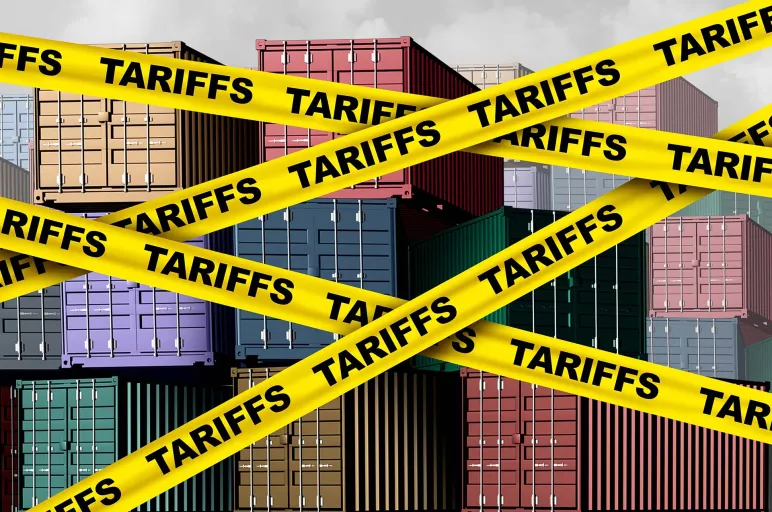
US Steel and Aluminum Tariffs: Impact Analysis & Risk Mitigation Strategies
- Tariffs on steel and aluminum are set to disrupt global supply chains and could trigger a trade war, forcing manufacturers to hike costs as well as adapt to the changes.
- Businesses are implementing strategies to mitigate the impact, including contract renegotiations, supply chain diversification and operational optimization.
- The tariff changes emphasize the need for resilient and agile supply chains, stronger supplier relationships and renewed attention on long-term strategic planning.
February 17, 2025 | Risk Management
The announcement of 25% tariffs hike on steel and aluminum imports to the U.S. has sent shockwaves through global supply chains, creating sudden challenges for manufacturers and procurement professionals, and possibility of a trade war. This sweeping policy change by the Donald Trump administration is bound to trigger a cascading effect across industries — such as automotive, construction, consumer goods and packaging.
What’s the Immediate Market Impact?
The immediate effects will be substantial and far-reaching.
Domestic steel and aluminum prices will continue to surge ahead post the announcement. This price volatility has already created tensions and significant challenges for manufacturers, particularly in industries with thin profit margins and limited pricing power.
Manufacturing sectors heavily dependent on these metals are experiencing compressed margins, with some reporting cost increases of up to 20% in their bill of materials. Small and medium-sized manufacturers have been particularly vulnerable, lacking the scale and resources to quickly adjust their supply chains or absorb higher input costs.
Implications for Global Trade
International response will likely be swift. As and when the tariffs get reworked, key trading partners will accordingly implement retaliatory or reciprocal measures. The bottom line is that American exports across various sectors will also get impacted accordingly. The trade war has already created a complex web of trade barriers affecting global supply chains — which means businesses must take a fresh look at their sourcing strategies and operational models.
The automotive industry, for instance, has reported high average cost increases per vehicle, while construction projects are facing higher material costs. These increases will eventually be passed on to consumers — affecting everything from cans to construction materials.
Contractual Protection as a Strategic Risk Mitigation Approach
Businesses must implement strategies to navigate this challenging environment. It’s time they looked at contract management as a crucial strategy. A comprehensive framework for managing tariff-related changes should now typically include the following clauses:
- When the U.S. implements a Universal Import Tariff post-SOW or statement of work effective date that increases supplier's total tariff and duty burden for importing goods, this can be treated as a Work Change (tariff event) under the agreement.
- The tariff adjustment mechanism applies exclusively to goods imported on or after the Universal Tariff's effective date, ensuring clear delineation of affected shipments.
- Any proposed adjustment by suppliers must be strictly limited to the actual cost differential between previous and new import costs directly attributable to the Universal Tariff.
- Both partners must engage in good faith negotiations to amend the Scope of Work and Purchase Order through a formal Change Order process.
- Companies maintain the right to terminate purchase orders for goods that haven't cleared customs by providing written notice within a month of receiving the Change Order.
Additional Strategic Responses
Beyond contractual protection, businesses can implement comprehensive mitigation strategies, including:
Supply Chain Restructuring
Companies need to diversify their supplier base, exploring alternative materials and developing regional supply networks to reduce tariff exposure. This should also include looking for suppliers in non-affected countries and developing domestic sourcing alternatives.
Operational Optimization
Manufacturers are implementing advanced analytics to optimize inventory levels, reviewing product designs for material substitution opportunities, and accelerating automation initiatives to offset increased material costs.
Financial Protection
Businesses are expanding their use of financial instruments to protect themselves against price volatility, including forward contracts and options on metal futures.
Long-term Strategic Implications
The current tariff situation is accelerating several long-term trends in supply chain management, including:
- Increased focus on supply chain resilience over pure cost efficiency
- Acceleration of automation and digital transformation initiatives
- Greater emphasis on supplier relationship management and strategic partnerships
- Development of more sophisticated risk management capabilities
What Next?
Businesses must prepare for continued uncertainty in the metal markets while building more resilient supply chains. Success requires a balanced approach combining immediate cost mitigation with long-term strategic planning.
Navigating this complex landscape will require companies to prioritize flexible and adaptive supply chain strategies. It's essential not only to enhance these capabilities but also to cultivate strong relationships with suppliers and ensure operational efficiency.
Businesses that focus on these areas and put in place solid contractual protections will find themselves better prepared for tariff-related challenges and so will be able to sustain their competitive edge. Emphasizing collaboration and adaptability will be key to long-term success.
Also Read: Trump Tariffs: Implications on Trade and 5 Key Supply Chains Strategies to Navigate Them



